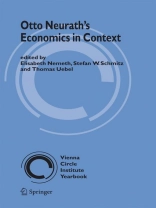Otto Neurath (1882-1945) was a highly unorthodox thinker both in philosophy and economics. He proposed a radically expanded scope of economic analysis that would facilitate a comparative and systematic study of the impact of a great variety of economic and political measures on a population’s well-being. Neurath regarded the controversial and widely misunderstood concept of calculation in kind as an indispensable instrument for anyone (economist or politician) who sought to analyze economic relationships from a wider perspective than that of price formation under market conditions. What is the impact of alternative (economic, political or organisational) measures on living conditions? What are the appropriate methods to compare and to rationally choose among alternative measures? In Neurath’s opinion, answers to these questions are crucial for every democratic government.
The contributions to this sparkling new book conclude that Neurath touched on many of the most criticalproblems of economic theory during its formative years as a modern discipline; his economics provides insights into the foundational problems of modern economics and should encourage contemporary economic theorists to critically reflect their own hidden presumptions. Neurath’s arguments continue to challenge the foundations of today’s neo-liberal approach to political-economy. They have also been rediscovered by researchers in the fields of ecological economics and of sustainable development as visionary and original. His comprehensive theory of life conditions and life quality anticipated the questions development economists and the general public meet today.
विषयसूची
Neurath’s Economics in Context.- “Freeing up One’s Point of View”: Neurath’s Machian Heritage Compared with Schumpeter’s.- Otto Neurath as an Austrian Economist: Behind the Scenes of the Early Socialist Calculation Debate.- Otto Neurath’s Concepts of Socialization and Economic Calculation and his Socialist Critics.- Pluralism and Economic Institutions.- Neurath on Money: Some Reflections on Neurath’s Monetary Thought in the Historical Context of the Birth of Modern Monetary Economics.- A Similar Line of Thought in Neurath and Sen: Interpersonal Comparability.- The War Economy and the War Museum: Otto Neurath and the Museum of War Economy in Leipzig, c. 1918.- Economy, Ideology and Culture: Otto Neurath’s Approach to a Precarious Relationship.- General Part.- Consensus in Art and Science.- Analyticity and the A Priori: Fifty Years of “Two Dogmas”.- A Second Appraisal: New French Literature on Logical Empiricism.- Reviews.












